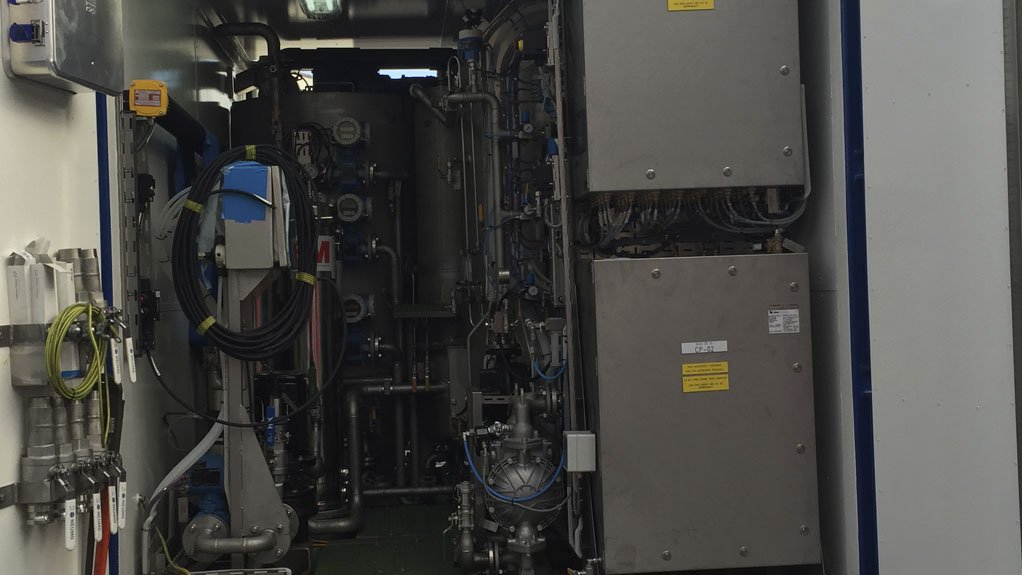Angolan oil and gas services company Friburge has acquired the exclusive rights to provide waste treatment solutions using wastewater treatment company Nature Oil & Gas’s technology in sub-Saharan Africa.
The waste treatment solutions are on-board solutions to treat wastewater, or slops collected from drains and wells or during clean-ups of drilling equipment, platforms or tanks that are flushed regularly with water or chemicals to clean them of debris and built-up residue.
The technology allows for the on-site treatment of slops at various operations, such as offshore installations, drilling operations or on-shore industrial facilities.
Friburge CEO Miguel Dos Santos explains that the treatment solution also includes the company’s 3.7 m mobile unit, which is placed on site and can treat water at a rate of 20 m3/h to as low as three parts per million, which can be discharged into the sea.
“The flow capacity and parts per million efficiency depend on the installation’s setup,” he says.
For small tanks and/or small quantities of slops, the unit can be stopped and started and even removed from the location.
Further, the main phases of the slops after the chemical injection, which allows for separation of the wastewater, are the oil phase, which comprises 3%, the water phase, which comprises 90% of the volume, and the sludge phase, which comprises 7% of the volume.
In 2008, Nature Oil & Gas installed the first mobile slop- processing facility offshore. These mobile units have operated or are being operated globally in, for example, Brazil, Canada, Norway and the US.
The benefits of mobile slop processing include reduced transportation and processing costs, reduced tank-cleaning costs on supply vessels, reduced spill risk, compliance with zero-hydrocarbon-impact regulations and associated pollution, being environment friendly, and reduced hazardous waste delivery ashore from the oil rig by up to 95%.
Dos Santos points out that the compact unit takes up little space on the rig and, because the slops or sludge storage tanks are emptied more often, the rig is freed up because less space is needed to store untreated waste, owing to the fact that it can be treated more frequently.
He maintains that the mobile processing facility is relatively easy to set up and can be ready for operation within three to four days, with a low power consumption of 16 kWh.
Dos Santos emphasises that this method of treatment is regarded as the best proven technology, compared with conventional methods. Such methods entail the storage of slop in tanks offshore at operational sites and, when the tanks are full, transportation by vessels to shore, where they are then transported to treatment facilities.
“Our technology cuts out the transfer to onshore facilities and the wastewater is treated on site instead. This eliminates costs, logistical risks of a transfer onshore, and makes discharge restriction compliance easier, as offshore discharge policies are less [stringent],” he explains.
Dos Santos highlights that the exclusive rights were acquired from Nature Oil & Gas, owned by Norwegian company Nature Group, which has more than 25 years’ experience as a waste specialist for offshore and marine businesses.
“Friburge believes in delivering services to high international quality standards and is committed to ensuring the safety of its people and assets,” Dos Santos notes.
In achieving this commitment, the company is undergoing a certification process for nonprofit business association TRACE Certificate and the auditable certification standard, SA 8000 accreditaton.
He explains that TRACE is a globally recognised due diligence certification, adding that it is a comprehensive due diligence audit that makes vetting processes with multinational companies easier.
Meanwhile, Friburge has about 80 Angolan operators and inspectors who perform two-million onshore inspections a year, 45 000 offshore inspections and 68 000 ship-to-ship manoeuvres – large-scale military exercises – a year. Products inspected for delivery, quality and quantity include gas, petrol and jet fuel.
“The company aims to ensure skills and technical capability transfer, which will guarantee that its technical partner will train local operators. We hope to expand to countries such as Ghana, Nigeria and Equatorial Guinea,” concludes Dos Santos.
Edited by: Zandile Mavuso
Creamer Media Senior Deputy Editor: Features
EMAIL THIS ARTICLE SAVE THIS ARTICLE
To subscribe email subscriptions@creamermedia.co.za or click here
To advertise email advertising@creamermedia.co.za or click here













